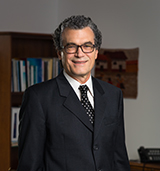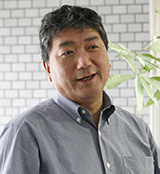Colleagues: Recently Tenured
ZHEN CHEN, PH.D., NICHD
Senior Investigator, Biostatistics and Bioinformatics Branch, Division of Intramural Population Health Research, Eunice Kennedy Shriver National Institute of Child Health and Human Development

Education: People’s University of China, Beijing, China (B.A. in economics); University of Connecticut, Storrs, Connecticut (M.S. in economics; Ph.D. in statistics)
Training: Research fellow, Biostatistics Branch, National Institute of Environmental Health Sciences (2001–2003)
Before coming to NIH: Assistant professor, Department of Biostatistics and Epidemiology, University of Pennsylvania (Philadelphia; 2003–2008)
Came to NIH: In 2001–2003 for training; returned in as a staff scientist in NICHD; became an investigator in 2009
Selected professional activities: Associate editor, Statistics in Biosciences; Regional Advisory Board, International Biometrics Society’s Eastern North American Region; board of directors, International Chinese Statistical Association
Outside interests: Photography; playing badminton
Website: https://irp.nih.gov/pi/zhen-chen
Research interests: I am developing statistical methods that will help researchers analyze and interpret data from epidemiological studies related to maternal and child health. I have focused on Bayesian statistical methods and their applications in analyzing diagnostic accuracy data and modeling chemical mixtures.
In my diagnostic accuracy work, I designed and led the NICHD Physician Reliability Study (PRS), a methodological-clinical study that was built from another larger epidemiological study on endometriosis. My team’s goal was to develop statistical methods that could be used to empirically estimate the accuracy of endometriosis diagnosis. This work is important because we don’t know what causes endometriosis or what the practitioner-related factors are that influence how accurately it is diagnosed.
For the PRS, we invited gynecologists with different levels of expertise to render gynecologic diagnoses based on clinical information ranging from symptomology to operative reports, imaging data, and histologic findings. We found that the more clinical information we provided to the physicians, the more likely they were to make an accurate diagnosis of endometriosis. Moreover, their diagnostic precision was not significantly associated with their level of experience.
Statistical approaches for modeling chemical mixtures is an exciting and emerging field, especially when exposures to environmental pollutants are measured and analyzed in relation to health outcomes. In one project, my team developed and applied a statistical approach, called latent-class modeling, to a study of polychlorinated biphenyls (PCBs) and endometriosis. Our analysis revealed that there was a significant association between specific PCB compounds and incident endometriosis.
In the future, I plan to continue developing statistical approaches and will incorporate receiver operating characteristic curve analysis, which is used to assess the performance of diagnostic tests. This work will have applications in a broad range of studies including NICHD’s Fetal Growth Studies, in which one research question is whether doing fetal ultrasounds closer to delivery is better than early screening scans at predicting a newborn’s size at birth. I also plan to develop and use other statistical methodologies, such as causal-mediation analysis, that will help researchers understand and delineate biological pathways by which treatments or exposures affect health outcomes.
JESSICA GILL, C.R.N.P., PH.D., NINR
Senior Investigator, Tissue Injury Branch, Brain Injury Unit, and Deputy Scientific Director, National Institute of Nursing Research

Education: Linfield College, McMinnville, Oregon (B.S. in nursing; minor in biology); Oregon Health and Sciences University, Portland, Oregon (M.S. in psychiatric nursing); Johns Hopkins University School of Nursing, Baltimore (Ph.D.)
Training: Postdoctoral fellowship, National Institute of Mental Health (2007–2009); assistant clinical investigator, NINR (2009–2010)
Before returning to NIH: Assistant professor in nursing, George Mason University (Fairfax, Virginia) and Krasnow Institute for Advanced Studies (Fairfax, Virginia)
Came to NIH: In 2007–2010 for training; returned in 2012 as a Lasker Clinical Research Scholar and tenure-track investigator, NINR
Selected professional activities: Elected to serve on the National Academies Committee on Disability Assessment for traumatic brain injuries within the U.S. Department of Veterans Affairs; co-director of biomarker cores for the Center for Neuroscience and Regenerative Medicine, and National Collegiate Athletic Association consortium; editorial board member for Journal of Head Trauma and Rehabilitative Medicine, Journal of Neurotrauma, and Brain Injury
Outside interests: Traveling; spending time with her children
Website: https://irp.nih.gov/pi/jessica-gill
Research interests: I am interested in traumatic brain injury (TBI) in military personnel and civilians as well as in athletes with concussions. My lab is undertaking studies to determine the mechanisms underlying the neurological symptoms and deficits of these injuries. We are using leading-edge technology to identify and link -omic biomarkers to neuronal damage through brain-imaging methods that are unique to the NIH. I am developing methods for identifying brain-injured patients who are at risk for a poor recovery.
In a 2017 study, colleagues and I showed that measuring concentrations of a protein called tau in the blood could potentially provide an unbiased tool to help prevent athletes from returning to action too soon and risking further neurological injury. Tau is also connected to the development of Alzheimer and Parkinson diseases and is a marker of neuronal injury after severe TBIs. Recently, we reported that we have identified tau and other proteins in the blood within 48 hours of a TBI. We also found that we are able to use advanced imaging to identify patients with neuronal injuries.
My interest in research began during my nursing undergraduate career when I volunteered with women and children whose lives were negatively affected by violence. I observed that this extreme stress resulted in differing outcomes, with some women being substantially impaired, whereas others were able to recover. I went on to pursue a graduate degree in psychiatric nursing, which included clinical training in the post-traumatic stress disorder (PTSD) program at the U.S. Department of Veterans Affairs. Research questions about trauma and resiliency were amplified during my work with Vietnam veterans who remained affected by their combat service decades after returning home. Based on these volunteer and clinical experiences, I decided to pursue a doctorate in nursing. My dissertation research demonstrated the presence of high rates of PTSD in urban health-care-seeking women and that a PTSD diagnosis was associated with perceived health declines as well as with higher concentrations of inflammatory markers and a dysregulation of endocrine functioning.
My discoveries are providing the foundation for early interventions to prevent the often-irreversible symptoms resulting from post-TBI neurological damage.
PERWEZ HUSSAIN, PH.D., NCI-CCR
Senior Investigator, Laboratory of Human Carcinogenesis, Center for Cancer Research, National Cancer Institute

Education: Magadh University (now Patliputra University), Patna, India (B.S. in zoology); Patna University, Patna, India (M.S. in zoology); Jawaharlal Nehru University, New Delhi, India (Ph.D. in cancer biology)
Training: Postdoctoral fellow, Swiss Institute for Experimental Cancer Research (Lausanne, Switzerland); visiting fellow (1994–1996) and research fellow (1999–2000), Laboratory of Human Carcinogenesis, Division of Cancer Etiology, NCI
Came to NIH: In 1994 for training; in 2000 became staff scientist in NCI (2000–2009); in 2009 became tenure-track investigator
Selected professional activities: Chairman, Pancreatic Cancer Interest Group, NIH; editorial board member for Carcinogenesis, Cancer Molecular Medicine, International Journal of Cancer, and Journal of Pancreatic Cancer
Outside interests: Gardening; exploring mountains
Website: https://irp.nih.gov/pi/s-perwez-hussain
Research interests: My research focuses on pancreatic cancer. My lab is using an integrative-biology translation-research approach to investigate the molecular pathogenesis of pancreatic cancer. Pancreatic cancer is one of the most lethal malignancies with a median survival of six months and a five-year survival of a mere eight percent. The dismal prognosis in this cancer is due to the lack of an effective therapy and reliable biomarkers for early diagnosis. Understanding pancreatic tumor biology is essential if we are to develop strategies for prevention, diagnosis, and effective therapeutic intervention.
We are particularly interested in the role that inflammatory mediators play in the underlying mechanisms of tumor progression and therapeutic resistance. We are analyzing clinical samples to evaluate how genetic and metabolic markers are associated with disease aggressiveness. We are also using pancreatic cancer cells, genetically engineered mouse models of pancreatic cancer, and patient-derived xenografts to investigate how the disease progresses.
The overall aim of our research is to understand pancreatic tumor biology and identify critical pathways associated with tumor progression and disease aggressiveness that can be targeted for therapeutic intervention.
In one of our current projects, we are investigating the role of a proinflammatory cytokine—macrophage migration inhibitory factor (MIF)—and nitric oxide in tumor biology. These are two interconnected mediators of immune and inflammatory responses that are produced by both tumor epithelial cells and inflammatory cells. We have recently shown that increased expression of MIF in tumors is significantly associated with poor outcomes in pancreatic cancer, induced epithelial-to-mesenchymal transition, and enhanced tumor growth and metastasis. We are exploring whether MIF and other inflammatory mediators are candidate therapeutic targets in pancreatic cancer.
In another project, we are using genomics, transcriptomics, and metabolomics to molecularly profile pancreatic cancer. The highly heterogeneous characteristics of pancreatic tumors underscores the significance of doing comprehensive and integrative molecular profiling in a larger cohort of tumors. We need to understand how several molecular events are intertwined as a network leading to the disease’s aggressiveness and poor outcome. The delineation of subtype-specific biology and critical pathways associated with disease outcome may identify subtype-specific candidate targets for therapeutic intervention.
ELISEO J. PÉREZ-STABLE, M.D., NHLBI
Senior Investigator, National Heart, Lung, and Blood Institute; Director, National Institute on Minority Health and Health Disparities

Education: University of Miami, Coral Gables, Florida (B.A. in chemistry); University of Miami School of Medicine, Miami (M.D.)
Training: Residency in primary care internal medicine, and research fellowship in general internal medicine, University of California at San Francisco (San Francisco)
Before coming to NIH: Professor of medicine, chief of the Division of General Internal Medicine, director of the Center for Aging in Diverse Communities, and attending physician, Moffitt-Long Hospital, Department of Medicine, University of California at San Francisco
Came to NIH: In September 2015
Selected professional activities: Elected to the American Society for Clinical Investigation (1996); elected to the National Academy of Medicine, formerly the Institute of Medicine (2001)
Outside interests: Loves movies, theater, music, arts, and visiting nature. Cats have had a special place in his life, too.
Website: https://www.nimhd.nih.gov/about/directors-corner/about.html
Research interests: My research interests began in Latino health and were especially focused on tobacco use. I have aimed to improve the health of racial and ethnic minorities and underserved populations through direct patient care, education, and discovery. Advancing patient-centered care will require a stronger foundation in primary care and improved cross-cultural communication skills among clinicians, as well as greater diversity in the biomedical research workforce.
I spent more than 30 years leading research on smoking cessation and tobacco control in Latino populations in the United States and Latin America. My collaborations with researchers and public-health advocates in Argentina helped put tobacco use on the country’s public-health agenda, raised awareness of tobacco use as a critical health problem, built capacity for tobacco-control policy, and created opportunities for prevention and treatment measures through physician education and smoking-cessation programs.
In addition, as a co-principal investigator of the NCI-funded Redes en Acción National Latino Cancer Control Research and Education Network, I spearheaded the development of a research agenda on cancer control for Latinos in the United States. I have also led research on aging among minorities.
I will continue my research at NIH and focus on three areas: 1) tobacco-use behavior as this relates to other substance use, unhealthy behaviors, chronic stress, and mental health among Latinos of different national origins; 2) differential risk of lung cancer among racial and ethnic minorities as reflected in metabolic biomarkers of nicotine and tobacco-specific carcinogens; and 3) communication factors—including language fluency, health literacy, numeracy, cultural factors, and unconscious bias—as they affect clinicians and minority populations within the NIH Clinical Center.
YOUSUKE TAKAHAMA, PH.D., NCI-CCR
Senior Investigator, Thymus Biology Section, Experimental Immunology Branch, Center for Cancer Research, National Cancer Institute

Education: School of Science, Tokyo Institute of Technology, Tokyo (B.Sc. in biological chemistry); Graduate School of Medicine, Osaka University, Osaka, Japan (M.Sc. and Ph.D. in immunology)
Training: Research fellow, Osaka University Medical School (Osaka, Japan; 1988–1989); visiting fellow and visiting associate, Experimental Immunology Branch, NCI (1989–1993)
Before returning to NIH: Director, Institute of Advanced Medical Sciences, and Professor of Experimental Immunology, University of Tokushima (Tokushima, Japan)
Came to NIH: In 1989–1993 for training; returned in 2018
Selected professional activities: Founding organizer, Global Thymus Network; editorial board, European Journal of Immunology; member, Science Council of Japan
Outside interests: Playing the shamisen (a plucked lute with three strings) for classical nagauta music (which accompanies kabuki theater); playing bass guitar for jazz-rock music [https://www.youtube.com/watch?v=u8MNvtHPKXQ]
Website: https://irp.nih.gov/pi/yousuke-takahama
Research interests: My main interests are the development and function of the thymus and thymic epithelial cells, especially with regard to the repertoire selection of T lymphocytes. In my lab, we are trying to understand the molecular mechanisms that build functionally competent thymus microenvironments that support the production and selection of T cells, govern thymic selection to establish a functionally competent repertoire of mature T cells, and position developing T cells to localize within the thymus microenvironments for T-cell repertoire formation.
In the next few years, the questions we’d like to address include determining how diverse microenvironments are formed in the thymus; figuring out how the thymic microenvironment contributes to the establishment of self-tolerance in T cells; studying the mechanisms of how developing T cells localize multiple thymic microenvironments for T-cell repertoire formation; and understanding how positive selection in the thymic microenvironment fine-tunes antigen responsiveness in T cells.
A better understanding of the molecular machinery that is essential for establishing thymic microenvironments and governing the selection of T cells should help us control immune diseases such as autoimmunity and allergy as well as overcome cancer and various clinical situations such as post-chemotherapy immune-cell reconstitution.
This page was last updated on Wednesday, April 6, 2022
